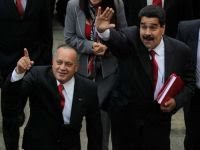Venezuela and Brazil strengthen their cooperation
Venezuela's presidential candidate of PSUV, Nicolás Maduro, has convinced the masses that he is the right man for the post. He also receives support from other progressive American countries, for example from Brazil, where the former President, Luiz Inác io Lula da Silva, spoke on his behalf.

by Olivia Kroth
Nicolás Maduro helped to form UNASUR and CELAC, together with Hugo Chávez. Lula da Silva said that "Hugo Chávez's great work was the transformation of Venezuela into a fair and just country. Surely Nicolás Maduro will fulfil these goals."
Almost ten years ago, in 2004, Brazil and Venezuela established their strategic alliance with 20 agreements in joint energy and defence projects, signed by the Brazilian President, Luiz Inácio Lula da Silva, and the Venezuelan President, Hugo Chávez Frías.
They were good friends, pooling their efforts to achieve synergy and using the immense potential of their countries for the benefit of their people. Both leaders were eager to speed up the integration of Latin America.
It was the beginning of a promising cooperation between the two state owned oil companies, Brazil's Petrobas and Venezuela's PDVSA. In 2004, Brazil and Venezuela also started new joint ventures in agriculture, mining and scientific development. The plans of buying Brazilian Embraer planes for Venezuela's state airline Conviasa were formed in 2004 as well.
With Brazil's help, Venezuela was able to join MERCOSUR in 2006. The official document, the Protocol for the Adhesion of the Bolivarian Republic of Venezuela to Mercosur, was signed at the Teresa Careno Theatre in Caracas, attended by President Luiz Inácio Lula da Silva from Brazil and President Néstor Kirchner from Argentina, among others.
Venezuela had to wait for another eight years, however, until the agreement could officially be ratified, because the right wing Congress of Paraguay refused to acknowledge the contract, trying to block socialist Venezuela's entry into MERCOSUR.
In 2007, Brazil joined the Bank of the South, upon invitation by Venezuela. The Bank of the South was President Hugo Chávez's idea, who announced it in his weekly Sunday TV show, Aló Presidente. The Bank of the South offers Latin American countries an alternative to the IMF and the World Bank.
In 2007, Venezuela paid all of its debts back to the World Bank and left this organization, which is seen as exploiting Latin America and stifling Latin American economic independence. The Bank of the South functions according to the principles of solidarity and cooperation between Latin American states.
Brazil's membership is very beneficial for the Bank of the South, because the Latin American giant has the biggest amount of foreign reserves on the continent, 111 billion USD, followed by Argentina with 38 billion USD and Venezuela with 32 billion USD of foreign reserves.
In 2008, the Brazilian and Venezuelan air forces began with joint aerial vigilance of their common borderline in the Amazonas region. Since 2008, regular VENBRA air force exercises have been held.
In 2009, the 6th Bilateral Summit of Brazil and Venezuela took place in the Venezuelan state of Zulia. The two Presidents, Luiz Inácio Lula da Silva and Hugo Chávez Frías, signed agreements in the fields of agriculture, energy and industry.
At another meeting in Salvador de Bahia, Brazil, they agreed on joint projects of hydrocarbon and hydroelectric production. Venezuela's National Electric Corporation CORPOELEC and the Brazilian construction firm Queiroz Galvao began to build the second dam of a large hydroelectric complex in the southwest of Venezuela.
In the same year of 2009, the Brazilian firm, Odebrecht, received a contract to expand the Caracas metro system. Venezuela's state-owned petrochemical firm, Pequiven, signed an agreement with Brazil's Braskem to produce chemicals in Bahia, Brazil. The Brazilian and Venezuelan digital television networks integrated their fiber optic lines through a connection point in the Venezuelan state of Bolívar.
In 2010, the intensified cooperation between Brazil and Venezuela continued with the signing of another 22 agreements in Brasilia. They pertained to the areas of agriculture, culture, energy, housing and tourism. Hugo Chávez said, "We have evolved more in eight years than in the 200 years before."
Hugo Chávez and Luiz Inácio Lula da Silva also signed an agreement for the "Bi-national Assistance Centres of Women Migrants on the Brazilian Border" and created the "Brazilian-Venezuelan Social Cabinet" for the eradication of inequality and poverty in both countries.
On the 1st of January 2011, Dilma Rousseff stepped onto the scene as Brazil's newly elected President. She continued with the work that her predecessor had successfully begun.
In February 2011, Venezuela's Minister of Foreign Affairs, Nicolás Maduro, met his Brazilian counterpart, Antonio Patriota, for talks about joint projects in agriculture and housing, especially between the AgroVenezuela Mission and EMBRAPA, a Brazilian firm for agricultural research. A second joint enterprise was the cooperation between Banco de Venezuela and Brazil's Caixa Federal.
In June 2011, Hugo Chávez met with Dilma Rousseff in Brasilia to discuss further cooperation in the areas of energy, finance and housing. They signed 14 agreements. In December of the same year, Dilma Rousseff visited Caracas to sign another 11 agreements in energy, housing, science and technology. It was her first state visit to Venezuela as Brazilian President.
"Brazil and Venezuela are on a new level of integration, which is productive and brings economic growth for our nations," Dilma Rousseff pointed out. Hugo Chávez and Dilma Rousseff revised earlier accords and made new plans for the future. "We have accomplished a million things in this decade," Hugo Chávez announced with great pride.
In 2011, commerce and trade between both countries grew by more than 20 percent. Brazil's exports to Venezuela amounted to 3.5 billion USD, a 14 percent increase, while Venezuela's exports to Brazil reached one billion USD, a 48 percent increase.
Nicolás Maduro hopes to augment Venezuela's exports to Brazil considerably in the next presidential term, between 2013 and 2019.
Prepared for publication by:
Lisa Karpova
Pravda.Ru
Subscribe to Pravda.Ru Telegram channel, Facebook, RSS!

